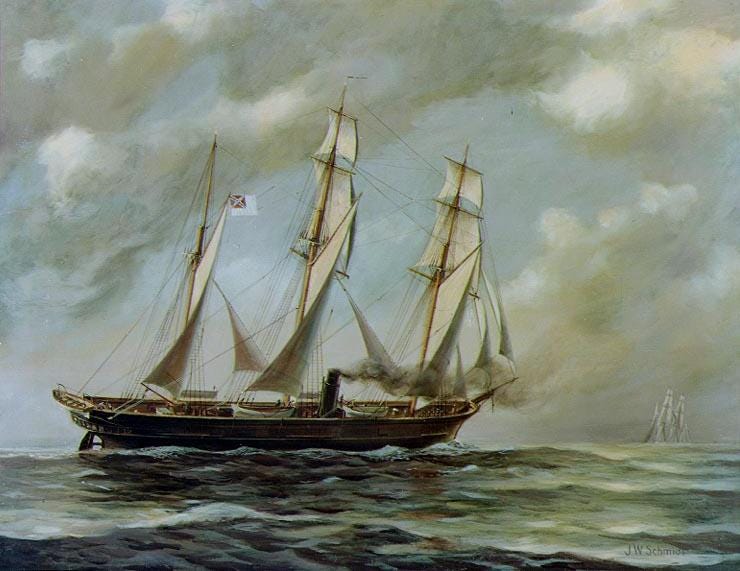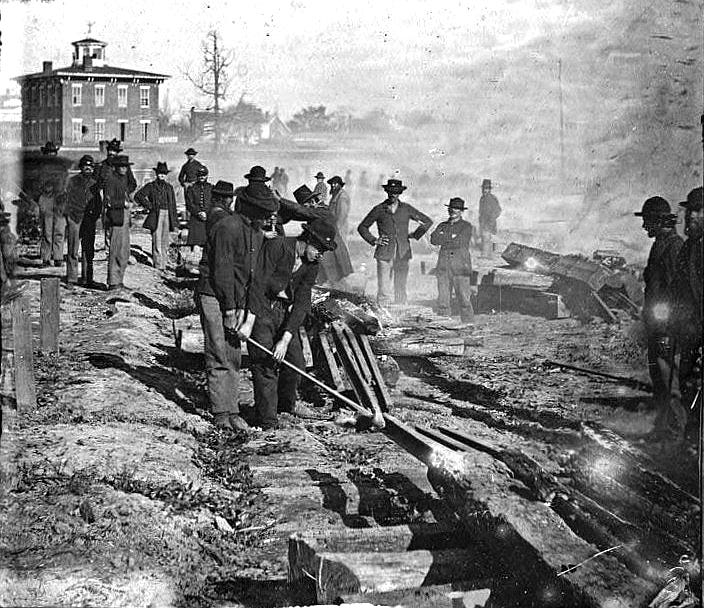It isn't time yet to march to Odessa, but it soon will be.
Lessons for Ukraine from the American Civil War
One of the great things about the study of history is that we can find patterns and situations that can provide us with guidance as to how events will likely end. There are no guarantees and each situation is unique.
One of the remarkable things in history is that very few defeated parties in a conflict will accept defeat prior to total loss. Many times they would be better off starting earlier to plan for a post-defeat reality.
Only rarely in grandmaster-level chess will the game go to the bitter end. Instead, conceding the game takes place. Meanwhile, with children playing, games will often go on far too long. When I was a child playing against my father, I would never concede, whether in chess or Monopoly. I was stubborn like that, holding onto hope that the tide would turn. Occasionally, I would fight to a draw in chess, but I did not want to surrender.
Looking at Ukraine after three years of war, there is a nice pattern that has developed and the outcome appears similar. The players involved and the resentments and causes are clearly different, but not so different as to not give us a guide. The below war isn't the only similar one, but it is highly applicable.
In 1861 the American Civil War started. I will not go into a long discussion of the grievances and motivations that caused the Civil War, but rather note that The South had lost political control to the North and decided it did not want to continue in union with the rest of the country. The South was not as industrial as the North. However, the South had a strong belief in its own superiority over the North.
When the war started, the South held an important economic position in the world, as Southern cotton was an important world trade commodity as was tobacco. The South believed the British and French would support them and there is at least some evidence that the Europeans encouraged secession.
The British did equip and man Confederate flagged commerce raiders, essentially war ships to attack US trade. The Confederate flag gave some pretense that the British were not at war and neither the British nor the French intervened directly.
The Civil War itself except for a few excursion to the North, was mostly fought by the South on defense. The North had more people, more resources, more industry, and was seeking to preserve the Union. The North initially believed it could win easily, and spectators, including women, went out to picnic and watch the early battles in northern Virginia, which were Confederate victories.
Gradually, the North started to win significant victories. By the end of 1863 a change had occurred, even if the Confederacy couldn't see it yet. Gettysburg, Vicksburg, Chattanooga, and Missionary Ridge, among other battles severely impacted the Confederate ability to wage war, even as both the Confederate capitol was well defended. Still, the South still believed that it had better soldiers and better generals and a stronger will to win than the North.
Lincoln transformed Gettysburg into a great morale boast for the North. Grant capturing Vicksburg gave the North control over the Mississippi River. Capturing Chattanooga secured a major railroad junction and manufacturing center. Once Grant and Sherman arrived, they prevailed in the Battle of Missionary Ridge, opening the invasion route to Atlanta.
Most importantly, after Missionary Ridge, Lincoln moved Grant to Virginia and tasked him with taking on Lee. 1864 saw the Western and Eastern combat theaters come closer together.
The war was lost at that point. Confederate president Jefferson Davis should have sued for peace, before the Battle of Atlanta and Sherman’s March to the Sea and before Grant’s Virginia Campaign. The South would have saved many lives and much destruction. The peace likely would have been far less punitive compared to Reconstruction and the decade-long military occupation.
The South did hold out hope of a British and French intervention, but it never came. First, with the development of cotton in Egypt and India, Southern cotton just was not as important. Second, Tsarist Russia, still angry once the Crimean War, threatened intervention on behalf of the North if the Brits or French went to war against the North. And finally, the South had lost and intervention would not have won the war.
The South didn't want to give up, though defeat was inevitable due to population and industrial base advantages. Finally, the March to the Sea and Grant’s brutal Virginia campaign helped break the will of the South. Even then, many Southerners didn't want to give up.
For his Virginia campaign, Grant used his manpower advantage and fought a series of bloody battles against Lee. Grant lost a lot of troops, but Lee couldn’t replace his as easily. Meanwhile, Sherman fought a long campaign to capture Atlanta, and then started his infamous March to the Sea, the intent of which was to destroy the morale of the South and convince its leadership to surrender.
Application to Ukraine
So, how does this apply to the Ukraine War. In case it isn't clear, today, Ukraine is analogous to the South and Russia to the North, and the US is in the position of the British and French. The Banderite-led Ukrainian leadership is highly motivated and ideological.
This does not mean that Ukraine or Russia is justified or correct or anything else, but merely that the geopolitical situations are similar and the outcomes as well. And these patterns have been clear for at least since the failed 2023 counterattack. Russia has been grinding down Ukrainian troops. The economic warfare from the West is ineffective at defeating Russia and, like the North, Russia is stronger than it was three years ago.
Following the pattern, the best outcome for Ukraine is a negotiated peace. The like the British paying compensation to the US over the commerce raiding, so the US is going to make concessions to Russia that might feel like defeat to some.
One sad part of the US Civil War is the South refused peace until defeated and then received a harsh peace. It was occupied after the war for more than a decade under Reconstruction. And then anger and resentment about the loss contributed to things like the KKK, Jim Crow, and a century of lynching and racial strife. The South also remained economically underdeveloped. Ukraine with the wrong peace could end up with 100 years of suffering.
So, after the White House disaster, what will happen with Ukraine, especially using the perspective of history to guide us.
Zelensky is effectively Jefferson Davis, unwilling to make peace. He might hold out in Kiev or Lvov or out-of-the-country. He can’t surrender without risking his own death.
The Ukrainians, especially the Galicians in western Ukraine, are not going to admit defeat. As such, another “March to the Sea” might be necessary, to break their will to fight (or just send other people to fight for them). Perhaps a Russian army attacking from Belarus and going west of Kiev could march all the way down to Odessa, breaking the remaining Ukraine in half and devastating the countryside a hundred miles wide.
Better for everyone would be to follow Trump and accept whatever terms he can get out of Putin. Putin does not Ukrainian speaking parts of Ukraine. He wants Ukraine neutral outside of NATO, with no offensive weaponry and with minimal troops. Putin also wants an end to sanctions.



